Magento Maintenance Services—What merchants don’t know?

Most of you might have a basic understanding of Magento website maintenance (as the name suggests). But if you’re neglecting it for long, you might not know its importance and how much it can hamper your business and customer experience.
Your Magento store is running smoothly today, but suddenly, an unexpected bug pops up, a critical security patch is overdue, or your site speed starts dropping. And yet, many merchants only think about maintenance when something breaks.
So, what exactly does Magento support and maintenance involve? How can it impact your store’s security, performance, and bottom line? More importantly, what are the key things most merchants don’t realize until it’s too late?
In this guide, we’ll uncover everything merchants often overlook about Magento maintenance services. Here, we’ll walk you through why this isn’t just a technical necessity—but a strategic move to protect and grow your business.
Let’s get started!
What is Magento Maintenance Service?
Magento Maintenance Service is the systematic process of regularly updating, monitoring, and optimizing your Magento-powered website to ensure its peak performance, security, and overall reliability. This service takes care of a range of activities—from routine check-ups, updates, and security patches to performance tuning, bug fixes, backups, and ongoing technical support—aimed at preventing downtime, enhancing user experience, and protecting your business from potential threats.
Magento support and maintenance isn’t just about fixing bugs when things go wrong—it’s an ongoing process to ensure your online store runs smoothly, securely, and efficiently. Think of it like servicing a high-performance vehicle.
You wouldn’t wait for your engine to fail before getting an oil change, right? The same logic applies to your Magento store.
What’s Included in Magento Maintenance Services?
Keeping your store in peak condition isn’t just about avoiding breakdowns; it’s about ensuring uninterrupted growth, security, and performance. So, what exactly does Magento maintenance involve?
Here are the Magento Support & Maintenance Services Offerings:
- Regular Site Health Audit
- Bug Fixes And Troubleshooting
- Website Security & Backup
- Update Third-Party Magento Extensions
- Update Third-Party Magento Extensions
- Website Performance Optimization
- Magento Themes Updation/upgradation
- Expert Support
1# Regular Site Health Audit
Your Magento store may look fine on the surface, but underneath, it could be struggling with:
- outdated scripts,
- broken links,
- database inefficiencies, or
- security vulnerabilities.
Regular site audits are like routine doctor checkups—they catch problems early before they become serious. These audits analyze everything from page load speed and server performance to code integrity and SEO errors.
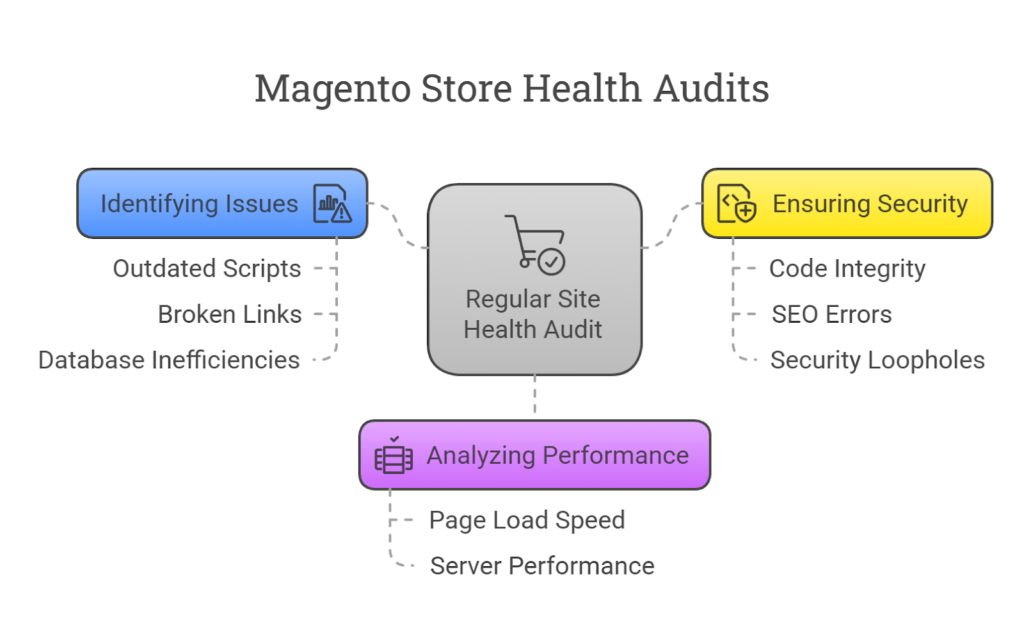
They help identify outdated extensions, misconfigured settings, and security loopholes that hackers could exploit. Without these routine checkups, merchants are essentially flying blind, unaware of the technical debt accumulating behind the scenes.
2# Bug Fixes And Troubleshooting
Once issues are identified in the site audit, the next step is troubleshooting and bug fixes. Even small glitches—like a slow-loading checkout or a non-responsive button—can frustrate customers and drive them away.
A Magento maintenance company continuously monitors and fixes issues before they escalate. Whether it’s broken JavaScript, misaligned layouts after an update, or a payment gateway error, proactive troubleshooting ensures that your store remains functional.
Waiting for customers to report problems is risky—many won’t bother complaining; they’ll just leave and never return.
3# Website Security & Backup
Your Magento stores handle sensitive customer data, making them prime targets for cyberattacks. A single vulnerability could lead to data breaches, stolen customer information, or a complete site takedown.
Security updates, firewall configurations, and malware scans act as a defense system, blocking threats before they infiltrate. But security is only one piece of the puzzle.
What if your store crashes completely?
Without a recent backup, recovering lost data can be a nightmare. Regular off-site backups ensure that even in the worst-case scenario, your store can be restored quickly without permanent damage. Implementing DDoS protection and proper SSL setup are also crucial aspects of Magento ecommerce support services.
4# Magento Version Upgrades
Many merchants delay Magento updates because “everything seems to be working fine.” But here’s the problem—running an outdated version means:
- You’re missing out on speed improvements and new functionalities.
- Your store is at risk because older versions have known security vulnerabilities.
- Compatibility issues may arise with extensions and third-party tools.
Every new Magento release comes with performance enhancements, security patches, and compatibility fixes. Skipping these updates means missing out on critical improvements and leaving your store vulnerable to known exploits.
Keeping your Magento version up-to-date isn’t just about new features—it’s about protecting what you’ve built. Magento 2 maintenance services are especially crucial for those who have upgraded to the latest version of the platform.
5# Update Third-Party Magento Extensions
Extensions add powerful functionality to your Magento store, but they can also introduce conflicts, slow down performance, and create security loopholes if not maintained properly. Just because an extension worked when you installed it doesn’t mean it will keep working as your store evolves.
Regular updates, compatibility checks, and performance assessments prevent outdated plugins from dragging down your site. A neglected extension can silently affect user experience and ultimately can increase cart abandonment and lost sales without you even realizing it. Proper extension installation and management are key components of effective Magento support services.
6# Website Performance Optimization
A growing product catalog, advanced functionalities, and third-party extensions can gradually slow down your website.
What once loaded in a blink may start taking precious extra seconds.
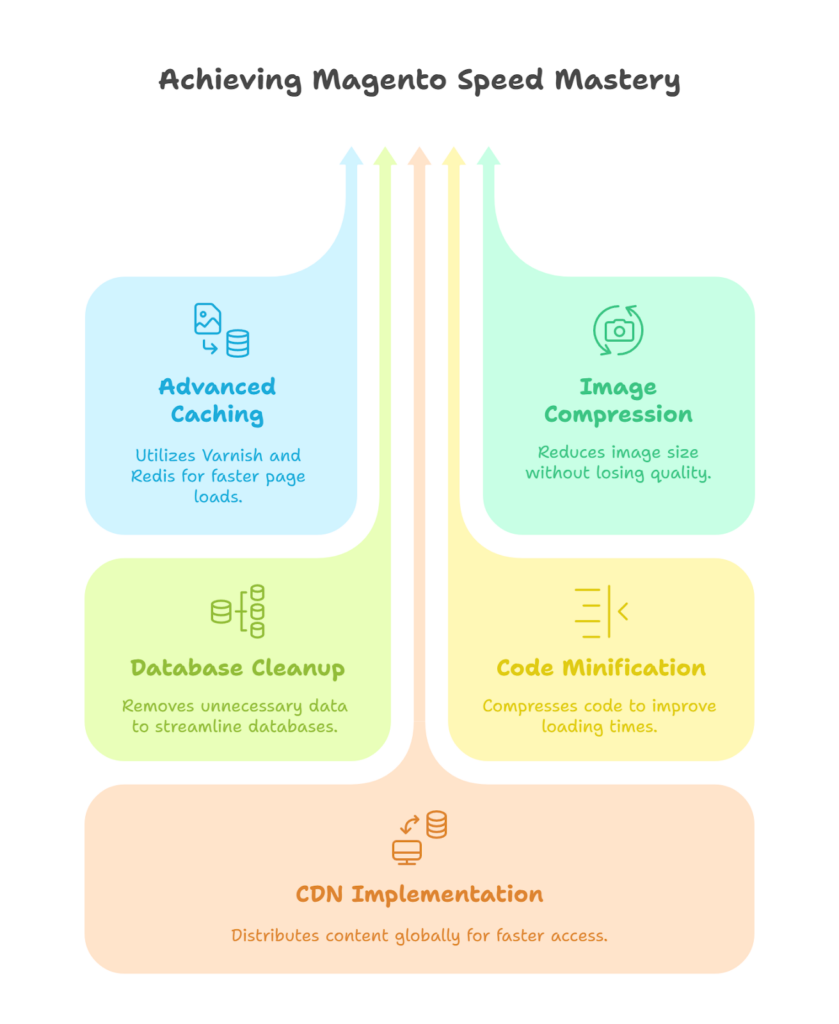
Magento performance optimization involves a combination of advanced caching, image compression, database cleanup, and code minification to keep things running smoothly. Implementing technologies like Varnish caching, Redis, and CDN (Content Delivery Network) ensures that your pages load instantly, no matter how large your catalog grows.
With search engines prioritizing page speed, a well-optimized Magento store doesn’t just retain customers—it ranks higher, attracts more traffic, and boosts sales.
Speed isn’t just a convenience; it’s a competitive advantage. Regular monitoring system checks and server configuration optimizations are essential for maintaining optimal loading speed and scalability.
7# Magento Themes Updation/Upgradation
Your store’s theme isn’t just about aesthetics—it directly affects usability, mobile responsiveness, and overall shopping experience.
As Magento releases new updates, your theme must evolve alongside it. An outdated theme can cause compatibility issues with the latest Magento versions, leading to broken layouts, misaligned buttons, and a disjointed user experience.
Beyond compatibility, theme updates improve performance, introduce modern UX elements, and enhance mobile responsiveness, which is critical since over 70% of online shopping happens on mobile devices.
A well-maintained theme enhances usability, guiding customers effortlessly from browsing to checkout.
8# Expert Support
Even with regular maintenance, unexpected issues can arise—whether it’s a checkout failure, a sudden drop in performance, or a security concern. That’s why Magento Maintenance Services offers expert Magento support on standby to ensure that problems are diagnosed and resolved before they impact your business.
A dedicated team support doesn’t just fix problems; they proactively monitor your store, implement performance improvements, and guide you through Magento upgrades and feature enhancements.
Whether it’s troubleshooting an extension conflict, optimizing server performance, or ensuring PCI compliance, expert support provides the technical safety net that allows you to focus on growing your business instead of firefighting issues. Magento emergency support is crucial for addressing critical fixes and minimizing downtime.
Now many people get confused between Magento store maintenance and any other website maintenance. No, it’s not the same!
The next section will clear your doubts.
How do Magento Maintenance Services differ?
While all websites need regular upkeep, Magento maintenance isn’t quite like the routine care required for a standard website.
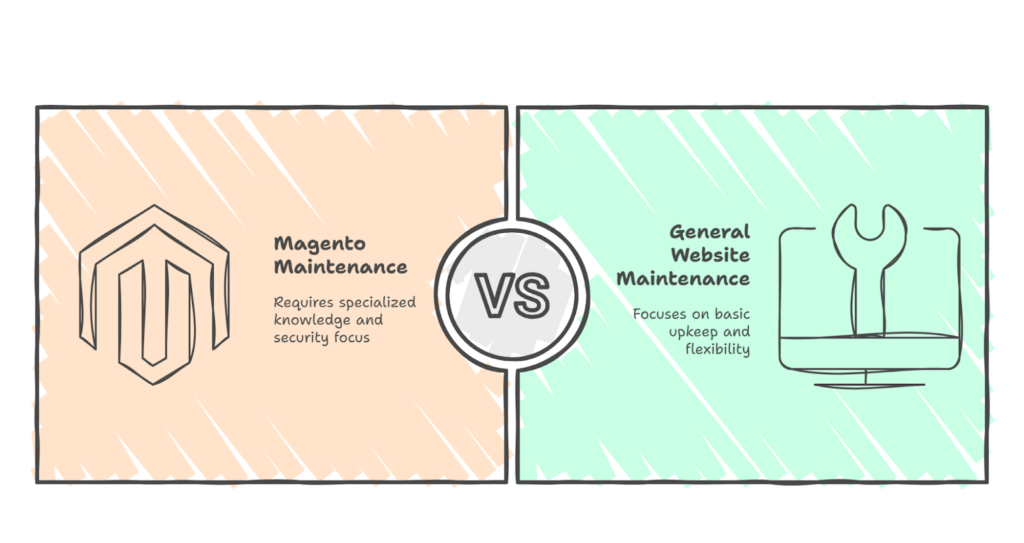
Let’s understand what sets Magento maintenance apart from general website maintenance:
Specialized Platform Knowledge
Magento is a feature-rich, complex e-commerce platform. Maintenance for Magento websites requires a deep understanding of its architecture, coding standards, and best practices. Specialized services ensure that updates, customizations, and integrations are managed expertly to avoid conflicts and downtime.
Security is Non-Negotiable
We’re talking about customer payment data, personal details, and transactions worth thousands (or millions) of dollars. Regular security patches aren’t just “nice to have”—they’re essential to keeping your business out of harm’s way.
Performance Optimization
Magento is powerful, but if you don’t actively fine-tune it, your site can turn into a sluggish mess. That means:
- Caching strategies.
- Database indexing.
- Image compression.
- Code audits.
All of these need to be dialed in to keep your site loading fast and your customers happy.
Updates Require Real Testing
Every new version, every security patch, and every extension update needs to be tested in a staging environment before going live—otherwise, you risk breaking your checkout process or crashing your entire store. Proper version control is crucial in managing these updates effectively.
Custom Features Need Ongoing Maintenance
If your store has custom-built functionality (which most do), maintenance is even more crucial. Code gets outdated, integrations break, and compatibility issues creep in over time. Keeping everything running smoothly isn’t just about reacting when things go wrong—it’s about staying ahead of the competition.
Also read: Why you should consider Magento Support and Maintenance Services?
What are the Benefits of Professional Magento Maintenance?
Magento is a dynamic platform that demands ongoing attention, but many merchants don’t realize the true scope of its maintenance needs. Professional maintenance isn’t just about fixing issues when they arise—it’s about creating a strategic foundation that drives long-term success.
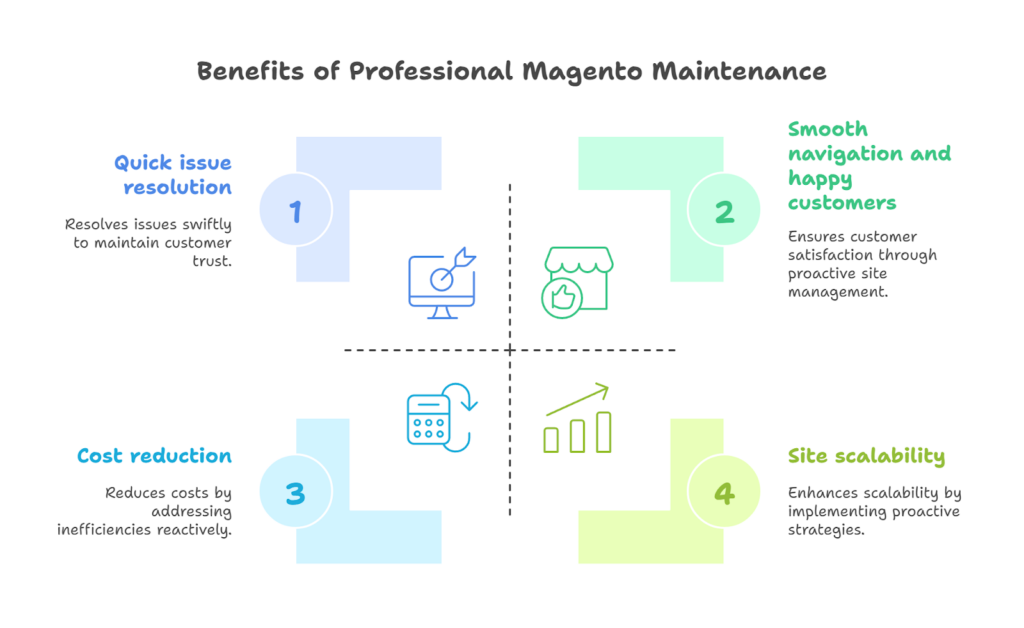
Here are the benefits of Professional Magento Maintenance:
- Professional maintenance ensures security patches are applied, vulnerabilities are fixed, and your store stays protected.
- Strong security protocols prevent data breaches, keeping your business and customers safe.
- Performance tuning, caching, and database optimization keep your pages loading at top speed.
- A well-maintained site means smooth navigation, frictionless checkouts, and happy customers who keep coming back.
- Proactive maintenance ensures your store can handle spikes in traffic and transactions without breaking a sweat.
- Spot and solve small issues before they turn into full-blown disasters that cause downtime and revenue loss.
- Identifying inefficiencies in your Magento setup can reduce unnecessary hosting expenses.
- Stay ahead with the latest Magento features, enhancements, and security updates without the hassle.
- With expert maintenance, you can focus on scaling your business instead of worrying about site crashes.
- A store that runs smoothly builds trust, boosts conversions, and keeps customers coming back for more.
Yes, somewhat your business success still depends on how you maintain your Magento store. So, it’s also important to see if your website is getting the right treatment or not.
Let’s check out the key considerations in the next section.
How to Choose the Right Magento Maintenance Plan?
When opting for a Magento Maintenance Service, you may be offered various plans to choose from. They vary in scope, support level, and the number of allocated hours per month.
Now here you have to think—are you investing in the right maintenance plan, or are you setting yourself up for future headaches? Many merchants make the mistake of choosing a plan based on price rather than actual business needs.
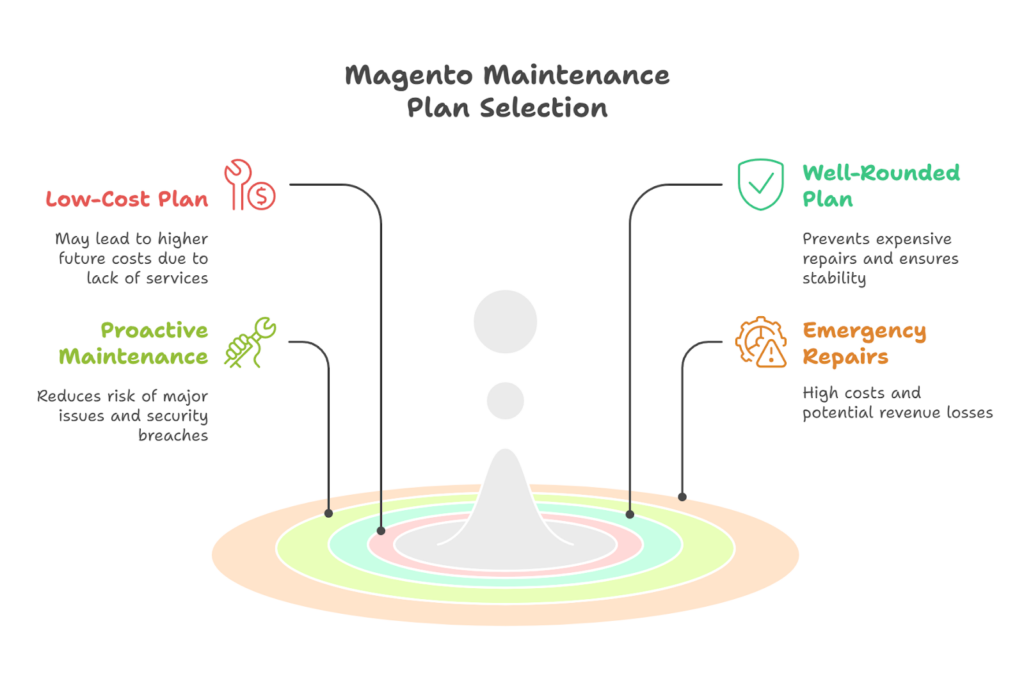
Let’s understand what you should consider when selecting the right one for your business.
1. Match the Plan with Your Business Size & Complexity
One of the biggest mistakes merchants make is underestimating the time required for proper maintenance.
For example, if you run an enterprise-level store with thousands of products, multiple third-party integrations, and high daily traffic, a 20-hour/month plan simply won’t cut it.
There won’t be enough hours to cover performance tuning, security updates, and issue resolution. As a result, it will leave critical tasks unfinished—risking performance slowdowns and security gaps.
The larger and more complex your store, the more time and resources you need for maintenance. Better to ask the agency to suggest the best Magento support package based on their website audit report.
2. Factor in Custom Development Needs
Does your business require frequent customizations or feature enhancements? If so, you’ll need a plan that includes enough development hours.
For instance, if you want to implement a custom checkout process, but your maintenance plan only covers basic bug fixes, you’ll have to pay extra for development work. Over time, these one-off charges add up, making an inadequate plan more expensive in the long run.
It’s better to discuss all the business requirements with your Magento agency before getting started with their services.
3. Ensure Proper Performance Monitoring & Optimization
Page speed directly affects sales and search engine rankings. A slow site leads to high bounce rates and lost customers.
If your maintenance plan doesn’t include regular performance monitoring, you might only realize there’s a problem after customers start complaining about slow loading times. A proactive plan continuously optimizes caching, database queries, and image compression to keep your store running at peak performance.
4. Consider Emergency Support & Downtime Prevention
Not all maintenance plans include emergency support. Some only cover scheduled maintenance, leaving you stranded if your site crashes unexpectedly.
Imagine your Magento store goes down on Black Friday. Without Magento emergency support, you’re stuck waiting for a response while losing thousands in potential sales. High-revenue businesses should invest in a plan that includes 24/7 emergency support to minimize downtime risks.
5. Look at SEO & Technical Optimization Support
Technical SEO is an often-overlooked part of Magento maintenance. Issues like broken links, missing meta tags, and slow-loading pages can gradually harm your search rankings.
If your maintenance plan doesn’t include regular SEO audits and optimizations, your store might lose organic traffic over time. A well-maintained store ensures that technical SEO factors are regularly addressed, keeping your search visibility strong.
6. Assess the Cost vs. Value Trade-off
It’s tempting to choose the cheapest maintenance plan to save money. However, a low-cost plan might lack essential services which leads to higher costs down the road when issues arise.
For example, skipping proactive maintenance may save money upfront, but when a major bug or security breach occurs, fixing it could cost thousands. Investing in a well-rounded Magento ongoing support plan prevents expensive emergency repairs and revenue losses.
Take the time to assess your store’s requirements and choose a maintenance plan that provides long-term stability, security, and performance. Because in eCommerce, prevention is always cheaper—and smarter—than fixing problems after they happen.
FAQs about Magento Maintenance Services
In case, some questions are unanswered above, we’ve dedicated this section to address them.
How Much Does Magento Maintenance Cost?
Magento maintenance costs can range significantly, from around $1,000 to $5,000+ per month depending on the scope of services, expertise required, and whether you hire an agency or freelancer.
On average:
- Basic plans (for small stores) range from $300 to $800 per month.
- Mid-tier plans (for growing businesses) cost between $1,000 to $3,000 per month.
- Enterprise-level plans (for high-traffic stores) start at $5,000+ per month and often include 24/7 support, security audits, and performance optimization.
How frequently do you Need Magento Maintenance?
Magento websites require regular maintenance to ensure security, performance, and compatibility. Performance optimization, database cleanup, and SEO audits should be conducted monthly. Security patches and software updates should be applied as soon as they are released to prevent vulnerabilities.
If you run a high-traffic store, daily monitoring, and proactive performance checks are necessary to ensure a smooth shopping experience.
What are the risks of neglecting Magento maintenance?
When the maintenance of the Magento website is neglected, there is a risk of a sudden breakdown or downtime. The most immediate risk is security vulnerabilities, as outdated software becomes an easy target for cyberattacks, potentially leading to data breaches, financial loss, and legal consequences. Performance issues are another major concern.
Without regular optimizations, your site can become slow, leading to high bounce rates and lost sales. Additionally, compatibility problems arise when third-party extensions and themes are not updated alongside Magento core updates, causing broken functionalities.
Over time, search engine rankings can also drop due to unresolved technical SEO issues like slow page speed and broken links. In short, neglecting maintenance turns a once-thriving store into a ticking time bomb—one that can cost a business its reputation and revenue.
How can businesses measure the ROI of Magento maintenance services?
The return on investment (ROI) of Magento maintenance isn’t always immediate, but it’s measurable through key performance indicators (KPIs).
Security-wise, businesses that invest in proactive maintenance avoid costly security breaches, which can amount to thousands or even millions in damages. Reduced downtime is another major factor; consistent maintenance ensures that critical issues are fixed before they cause revenue-impacting outages.
Additionally, SEO rankings improve when technical aspects like page load speed, mobile responsiveness, and structured data are consistently optimized. In financial terms, businesses can compare their revenue loss from site crashes, slow performance, or security issues against the cost of a maintenance plan.
Final Thoughts—Magento maintenance isn’t optional!
Many merchants see Magento maintenance as just another technical task, but as we’ve explored, it’s much more than that—it’s a crucial investment in your business’s security, performance, and long-term success.
Waiting until something breaks isn’t a strategy; it’s a risk that can cost you customers, revenue, and even your brand’s reputation. So, if you’ve been overlooking Magento support and maintenance or treating it as an afterthought, now is the time to rethink your approach.
With our Magento Maintenance and Support Services, we ensure your store is always secure, optimized, and running smoothly. Whether you need regular updates, performance enhancements, or emergency fixes, we’ve got the expertise to keep your business moving forward.
Need a Magento expert to handle the technical side while you focus on growth? Let’s talk.






Post a Comment
Got a question? Have a feedback? Please feel free to leave your ideas, opinions, and questions in the comments section of our post! ❤️